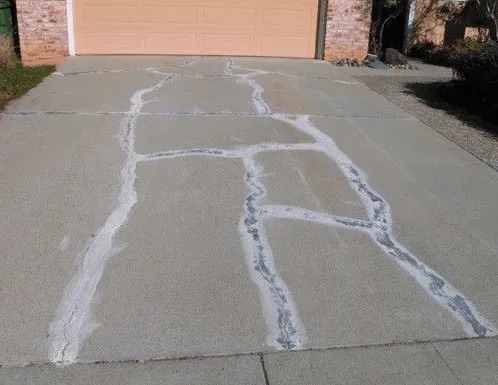When installed properly, concrete is one of the most durable and long-lasting products you can use around your home because of its terrific compression strength. However, concrete has low tensile strength, and when the ground settles/expands/recedes(which is often the case on the Front Range of Colorado), that “inflexibility” results in cracking.
Durable, high-strength, and crack-resistant concrete occurs when all conditions are right.
Often we see simple settlement cracks. Even though concrete is extremely durable, it’s hard to find a Front Range Driveway that doesn’t have at least one crack in it.
WHY CONCRETE CRACKS
1. EXCESS WATER IN THE MIX
Concrete does not require much water to achieve maximum strength; however, much of the concrete used in residential pours tend to have too much water added to the concrete on the job site. This water is added to make the concrete easier to install. This excess water will, however, reduce the final strength of the concrete by up to 200psi per gallon per cubic yard.
Shrinkage is another common reason for cracking. As concrete hardens and dries, it shrinks. This is due to the evaporation of excess mixing water. The wetter or soupier the concrete mix, the greater the shrinkage. To battle both of these water issues, we always limit the use of onsite water to one gallon per cubic yard of concrete. After pouring thousands of driveways, we have learned this is the optimal amount of water in the front range.
2. CONCRETE DRYING TOO FAST
Rapid drying of the slab will significantly increase the possibility of cracking – a common problem in less humid locations like Colorado. The chemical reaction, which causes concrete to go from a liquid or plastic state (or a solid-state), requires water. This chemical reaction, or hydration, continues to occur for days and weeks after you pour the concrete. If the concrete is not properly hydrated, you can develop cracks in your driveway.
We always recommend using curing sealers to limit the release of moisture from your driveway. Curing sealers trap the moisture in the concrete and keep it from escaping in the dry Colorado air.
3. IMPROPER STRENGTH CONCRETE POURED ON THE JOB
A weak pound per square inch (psi) can lead to significant cracking. It’s also an easy way to cut costs on a driveway. But you get what you pay for. The recommended psi for concrete in Colorado is 4000psi. Anything less than that, and your driveway could develop cracks. We design all residential flatwork mixes with 4500psi concrete. This allows our driveway crew to add a little water to the mixture if needed and still exceed the minimum recommendation for driveways in Colorado.
4. LACK OF CONTROL JOINTS (IN CONCRETE SLAB).
In a concrete slab, control joints help the concrete crack where you want it to. Since it’s almost impossible to install concrete driveways in Denver that do not crack, control joint design is critical. Traditional methods suggest the joints should be 1/4 of the thickness of the slab and no more than 2-3 times (in feet) of the thickness of the concrete (in inches). So a 4-inch concrete slab should have joints 8-12 feet apart. We design all our driveways in Denver and our garage floors with joints no more than 8′ apart. Whenever possible we try to get down to 6 feet if we can.
